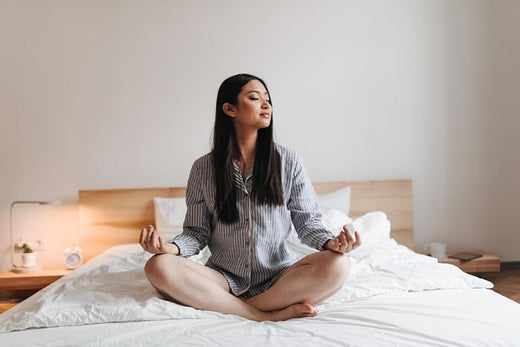My Cart

Want to Sleep Better? Consider Sleep Meditation

Have you often had difficulty going asleep and staying asleep? Have you ever tossed and turned all night on the mattress while your brain was on its own trip of random thoughts? For various reasons, everyone has gone through this sleep dilemma once in a lifetime for a shorter or longer period.
Your body and mind must be relaxed and calm when it comes to peaceful and adequate sleep. Though it sounds simple, it isn’t. Many individuals find it troublesome to fall and remain asleep throughout the night on many occasions.
Meditation is a science-backed and effective answer for sleepless nights.
What is Meditation?
Meditation is a mental exercise to achieve the highest level of spiritual awareness and gain benefits like relaxation, mental strength, and a break from stress and anxiety.
It turns out to be beneficial when you overthink at night, and your brain remains overactive with daunting thoughts, further increasing stress and strain on body parts.
A slow yet full of benefits, meditation is mainly a guided, self-disciplinary exercise that calms down the brain and creates a balance between brain and body, which makes suitable conditions to fall asleep and complete those 7 to 9 hours of zzz’s without disruptions.
How does meditation help?
Meditation is not some kind of switch to falling asleep but a practice that may be a valuable tool for well-being and sleep health over time. Many scholars have focused their studies on determining how to employ mindfulness to cure insomnia.
Here are some benefits that you can get out of practicing meditation before bedtime:
Reduces stress and anxiety
Stress and anxiety are inseparable parts of life, and they hamper sleep and peace of mind so negatively that their effects linger in life for longer than necessary. In some cases, severe stress and anxiety result in depression, fatigue, and insomnia.
Practicing meditation every night before sleeping helps you to eliminate these unwanted stress and anxiety and improve sleep quality.
Induces the relaxation response in the body
Meditating every night before hitting the mattress helps you focus your mind on the current situation rather than wandering off in useless thinking. Breathing techniques in meditation induce relaxation responses within your body, promising sleep quality improvement.
Creates balance in the nervous system
The central nervous system consists of two parts: one that keeps us attentive and the other that aids sleep. The sympathetic nervous system regulates processes such as arousal and inflammation. The parasympathetic nervous system controls the anti-inflammatory and relaxation responses. We require both, yet chronic stress makes them frequently out of balance. Meditation is beneficial in resolving nervous system imbalances.
Safer than other techniques
Meditation is much safer than other techniques like medicines and physical exercises to cure sleep-related issues like insomnia. It has no adverse effects on your body and is an entirely safe, refreshing and spiritually awakening experience.
Easy to learn and free to access, meditation techniques are suitable for everyone, despite age, gender or illness.
How to practice bedtime meditation?

To get ready for meditation, you can start with creating calm surroundings, turning lights off, closing doors and windows to block sounds, and putting on comfortable clothes like loose pajamas.
You can try various meditation methods to help you fall asleep and improve your health.
Deep breathing
Breathing exercises are always beneficial and help you distract from worries and overthinking and calm and relaxed. Breathing with the diaphragm is often used with several other meditation activities to help people unwind. Counting helps you control and slow your breathing. For example, the 4-7-8 breathing method entails breathing in for 4 seconds, holding it for 7 seconds, and then exhaling for 8 seconds.
Body scan meditation
This method is related to systematic muscle relaxation, where you focus on each muscle from toe to head individually and then create a chain cycle of straining and relaxing muscles.
You need to pay attention to the body parts touching the mattress below and then release the tension from those muscles with slow breathing and counting. This exercise helps you relieve any physical strain and fall asleep in the process.
Mindfulness
Exercising mindfulness requires your attention to the present moment and thoughts. You need to sense every muscle in your body, from toes to head and then relax slowly.
Counting
Counting ships or numbers backwards is one of the oldest and most effective methods to help you eradicate unwanted thoughts and fall asleep peacefully. When you slowly and steadily begin counting, you drift away into sleeping mode and proceed to deeper sleep.
Guided meditation
You may try guided meditation with the help of some experts or mobile apps specifically designed for meditation. From movement-based meditation like Tai chi to visualization of beautiful and serene places can be used in guided meditation methods.
Other ways to achieve better sleep quality
Though meditation helps you improve sleep quality, other ways may increase meditation benefits. Such as,
Daily regime
Follow a daily routine of sleep and wake time. Also, you can include meditation in a pre-bed ritual to improve your sleep quality magnificently.
Sleep environment
Creating a sleep environment is very important, such as turning off lights, maintaining room temperature at low degrees and using a bed or mattress that is comfortable and supportive.
Make sure your bed or mattress is suitable for your body needs and does not hamper your sleep with its withered, old and inadequate firmness. You can buy the Sleep Company’s SmartGRID mattresses to get maximum benefits, as its patented Japanese SmartGRID technology provides comfort and support simultaneously.
Exercise
You can try some exercises on a regular or alternate day basis in addition to meditation, such as walking, running, and yoga.
Diet
Make sure to eat proper nutritional food such as dairy products, poultry, vegetables, dry fruits and fruits to improve your sleep-inducing hormone level. Also, avoid eating heavy meals before bed to prevent digestion issues.
Bottom Line:
Regular meditation has a proven track record of providing benefits since ancient times. And when you incorporate it with your sleep time routine, its benefits are innumerable. Thus, make sure you implement meditation habits in your daily regime to prepare your mind and body for better sleep.






























































